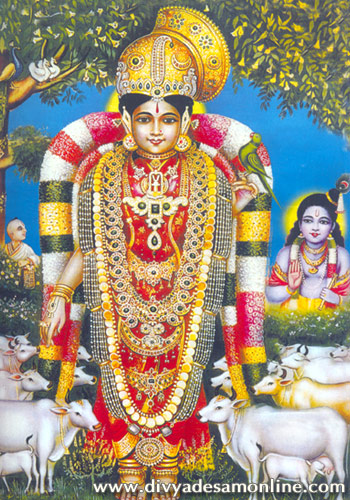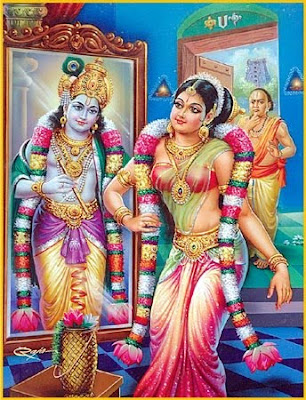| SRI ANDAL- A BRIEF LIFE-SKETCH |
| Sri Andal, one of the twelve Alwars and the only female saintess, lived in the first half of 8th century A.D. Some scholars fix the possible date of Andal as far back as 3000 years B.C. Andal was born at Srivilliputhur near Madurai, in the Tamil month Adi, with the birth-star Pooram, on a Tuesday, on the fourth day of the bright fortnight. Andal was a treasure-trove infant, obtained in the Tulasi garden, in the premises of the temple of Sri Vatapatra Sai. Perialwar, her father, found her while tending the garden and brought her up as an adopted child. Andal grew up in holy surroundings, worshipping the Deity and listening to holy discourses, Vedas, Epics, Bhajans, Keerthans, etc.. From childhood onwards she listened to the Leelas (pranks) of Krishna with rapt attention and developed a deep love to the Lord. Andal helped her father in weaving flower garlands to offer to the temple Deity every day. One morning, Perialwar observed her wearing and adorning herself with the flower-garland intended for the Deity and herself looking into a mirror and enjoying . He considered this as an act of sacrilege and, with great anguish, failed to offer the garland to the Deity on that day. The Lord appeared in his dream and informed him that He relished only the garland worn by Godai and that in future flower garlands worn by Godai alone be offered to Him. Perialwar relaised the divinity in Godai, and from thence she was reputed as “Andal” (one who ruled Bhagwan) and “Choodi Kodutha Nachiar” (patroness who would offer flowers after adorning herself). It became a routine for Andal to wear the flower garland prior to offering to the Deity. As Andal grew up, day by day, her love for Krishna also increased and she resolved to marry Him. When Andal attained adolescence, Vishnuchittar was amazed at her conviction to marry Krishna. She was advised to observe Margali Bath rituals, which was a custom of yore for marriageable girls to have choice husbands. Andal imagined herself as a cow-girl at the time of Sri Krishna, collecting all girls at Ayarpadi at dawn during the Margali month, day after day performing the ritual on the banks of the river Yamuna and bathing the Deity. This procedure, expressed lucidly in thirty Hymns, awakening her mates and proceeding to the river-bed, with Bhajan and Keerthan and to bath the Deity, is the topic of Tiruppavai. Apart form Tiruppavai , Andal also sung 143 Hymns in Nachiar Tirumozhi in which her expression of intense love to Krishna, in varying moods of bridal love--tender hope, utter dejection, joyful triumph, woeful sorrow and total surrender--are depicted. Andal concluded that Lord Krishna was none else than the Deity of Sri Rangam--Lord Ranganatha-- and chose Him as her Consort. Lord Ranganatha bade Perialwar in a dream to bring Andal to Sri Rangam in bridal decoration. A palanquin, duly decorated, was sent from the Sri Rangam temple, as instructed by the Lord in a dream to the temple chief. King Vallaba Deva made elaborate arrangements, decorated the procession route and greeted Andal with music and other paraphernalia of a Divine wedding. People cheered; King Vallaba also joined the bridal party. Andal proceeded inside the sanctum sanctorum of the temple and became one with the Lord, as she worshipped the Lotus Feet of Him. To the astonishment and wonder of the people assembled, Andal's physical body merged with the Deity, Lord Ranganatha. |
THIRUPAVAI
DAY 1
Introduction – Bhagwath Guna experience is the Bath.

It's Margali month, moon replete and the day is proper
We shall bathe, girls of Ayarpadi prosperous
Will you move out? You wealthy adorn'd fine jewels;
Narayana, son of relentless Nandagopala,
Whose job wielding a sharp spike ever alert and
The lion cub of Yasoda with eye gracious
And the lad with dark complexion, handsome eye
And face sunny bright pleasant as moon
Sure shall grant us the desire soon
To the esteem of this earth as a boon;
Oblige, involve, listen and consider, our damsel.
DAY 2
The acts forbidden and those to be followed.

You who enjoy life on earth, listen!
The rituals for deity go through we duteous;
Chant the foot of the Supremo who had
Reposed in stealth on the ocean milky;
Bathe we early; relish not ghee or milk
Nor would kemp, nor adorn with flower beauteous;
Grace not with eyeliner; nor bid deeds forbidden;
Nor go around ear kiss tale or malicious gossip
Help the worthy and poor utmost by gift or alms toss'd
With mind pleasant, study the chores engross'd;
Listen and consider, our damsel.
DAY 3
Blessings the country would achieve.

Should we sing the name of the magnanimous
Outgrown and meted the world and assent
To bathe for deity, rain it shall, pour country over
Thrice monthly with no despair;
Shall facilitate tall growth of fine paddy crop.
Carp to jump amidst like aquabatic feat,
Spotted bee to perch on lily fair and
Donor cows to stand still, with udders thick,
Allow milking to fill vessels copious;
To ordain never vanishing wealth bounteous;
Listen and consider our damsel.
THIRUCHENDUR -STHALA PURANAM
Soorapadma was a very powerful Asura who was causing immense hardships to Devas and mankind alike by his wicked deeds. The Devas appealed to Lord Shiva to spare them from the tortures of Soorapadma.
Lord Shiva generated six powerful sparks from His third eye called Netrikkan. Lord Vayu (god of air) and Lord Agni (god of fire) carried these sparks to river Ganges. Goddess Ganga carried them to Saravana Poygai, a holy pond.The sparks became six divine small male babies. By God's grace, six divine water nymphs (the six Krittikas) nurtured these babies.
With the blessings of His divine parents, Lord Murugan came to Tiruchendur with His armed group. He immediately sent Veerabahu as an emissary to Soorapadma and asked him to release all the Devas imprisoned by him. But the Asura refused. So Lord Murugan had no option but to wage war against Soorapadma and his legions. It lasted for ten days.
Lord Murugan defeated Soorapadma andyet before his death he tearfully prayed for pardon. Moved as he was, Shanmuga showed his cosmic form and accepted to make use of his peacock form as his permanent vehicle, and the cock to adorn his banner. Since then, though dead, Surapadman has been serving the Lord thus, with devotion unparalleled and obedience inimitable.
According to tradition, after the final battle on the beach at Tiruchendur, Lord Murugan felt remorse for His role in slaughtering Surapadma's demonic army. He therefore built a shrine nearby to His Father Lord Siva and worshipped Him there. Technically, therefore, the temple is dedicated to Lord Siva. Yet the mulasthanam deity is Lord Senthil Andavar Himself standing in a majestic and relaxed pose facing east towards the sea, alone and without His consorts Valli and Devasena.
Sri Adi Shankara wrote powerful mantra Subramanya Bhujangam. When Adi Shankara visited the shore temple of Lord Subramanya at Thiruchendur, he fell into a trance and the entire stanzas flowed from him. It is said that the Lord was so pleased with the mantras, words of devotion that came from Adi Shankara, that Lord Subramanya appeared, as stated in the mantra, in front of Adi Shankara. Devotees reciting this mantra will be rid of debts, sufferings and disease. Whoever recites this mantra will attain health, wealth, longevity, wisdom and heavenly abode.
Lord Murugan blesses everyone who worships Him. He extends Hissupreme grace to all those who pray before Him. He removes all the ills of people who come to Him. He never lets down His disciples. Worship Lord Murugan at Tiruchendur and seek His blessings. He never says NO to anyone. He will bless you with a blemishless and peaceful life.……….OM SARVANA BHAVAYA NAMAHA….
Kanta Shasti Vratam(Fasting)
Kanta Shasti Vratam is observed once a year in the month of `Aippasi' (October–November) starting from the `piratamai' the 1st phase of the brightening moon.Of all Kanta temples it is the one in Tirunchendur in Tamil Nadu, India that draws the largest number of Kanta devotees. The Kantan's Tiruvilaiyaadal (divine sport) Soora Samharam is enacted during the sixth day of the festival. This is a drama to grant a great boon to Curapatman by Kantan. Curapatman is given the honour of becoming Kantan's vehicle mayil vahanam (peacock vehicle) and ceval kodi (the rooster on Kantan's flag). During the six days of Kanta Shasti, devotees, usually fast. They fast in many different forms: some devotees take only one meal a day and that single meal is the evening meal; to some that single meal consist of fruit and milk; others forego all solid foods, even abstain from taking medication take only a liquid diet; some even forego the liquid diet. Of the above forms taking milk would defeat the purpose of clearing long stored fat. Not taking any liquids could be harmful, as many unwanted matters tend to remain in the body. The ideal form of fast would be that during all six days and nights to abstain from all solid food and even medicine but take water, coconut water, strained orange juice and or such permissible liquids. These liquids help to flush out unwanted substances and to clean the body.
At the end of the six-day fast the body is indeed cleaner than it was before. The mind is cleansed by the pilgrimage, meditation, worship and other devotional activities. A pure mind in a pure body is a sublime combination and conducive to realizing the Divine. This is the reward and benefit of Kanta Shasti Vratam. During the period of Kanta Shasti Vratam many devotees recite Kanta Shasti Kavasam. These are verses asking Kanta for protection. In verse after verse, numerous parts of the body are mentioned as requiring protection, but many more parts, and, it must be mentioned, vital parts are left unmentioned. It has been said, "Ask, and it shall be given unto you". God always grants you what you ardently desire, so it might be prudent to ask for protection and leave it at that, and Kanda will protect your whole self.






"HARE RaMA HARE RAMA
ReplyDeleteRAMA RAMa HaRe HARE
HARE KRISHNA HARE
KRISHNA KRISHNA
KRISHNA HARE HARE !!!"
JAI KRISHNA !!.......